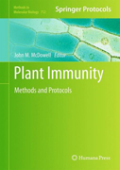
A great deal of effort is being invested in understanding the molecular mechanisms through which plants interact with pathogenic microbes. In Plant Immunity: Methods and Protocols , expert researchers in the field describe emerging technologies that can be applied to the most significant outstanding questions faced by scientists studying immunity in plants. The technologies in this detailed volume include methods for examining protein localization, protein complex purification, protein-protein interactions, transient and inducible gene expression, chromatin immunoprecipitation, microaspiration, laser microdissection, purification of fungal haustoria, and genetic manipulation of bacterial and oomycete pathogens. These techniques are applicable to a wide range of topics,including molecular functionality of NB-LRR proteins and other immune signaling components, and functional characterization of effector proteins and other pathogen components that sabotage host immunity. Written in the highly successful Methods in Molecular Biology™ series format, chapters include introductions to their respective topics, lists of the necessary materials and reagents, step-by-step, readily reproducible laboratory protocols, and key tips on troubleshooting and avoiding known pitfalls. Emphasizes emerging technologies in plant immunity. Easily applied to a wide variety of plant-microbe interactions. Contains expert tips on troubleshooting and key implementation advice. INDICE: Studying NB-LRR Immune Receptor Localization by Agroinfiltration Transient Expression. Fragment Complementation and Co-Immunoprecipitation Assays for Understanding R Protein Structure and Function. Purification of Resistance Protein Complexes Using a Biotinylated Affinity (HPB) Tag. Biochemical Purification of Native Immune Protein Complexes. Chromatin Immunoprecipitation (ChIP) to Identify Global Targets of WRKY Transcription Factor Family Members Involved in Plant Immunity. Dose Response to and Systemic Movement of Dexamethasone in the GVG Inducible Transgene System in Arabidopsis. Quantifying Alternatively Spliced mRNA via Capillary Electrophoresis. Constructing Haustorium-Specific cDNA Libraries from Rust Fungi. Microaspiration of Esophageal Gland Cells and cDNA Library Construction for Identifying Parasitism Genes of Plant-Parasitic Nematodes. Construction of Pseudomonas syringae pv. tomato DC3000 Mutant and Polymutant Strains. A Straightforward Protocol for Electro-Transformation of Phytophthora capsici Zoospores. Propagation, Storage, and Assays with Hyaloperonospora arabidopsidis, a Model Oomycete Pathogen of Arabidopsis. Assaying Effector Function In planta Using Double-Barreled Particle Bombardment. Assays for Effector-Mediated Suppression of Programmed Cell Death in Yeast. Purification of Effector-Target Protein Complexes via Transient Expression in N. benthamiana. Imaging Fluorescently-Tagged Phytophthora Effector Proteins Inside Infected Plant Tissue. Immunolocalization of Pathogen Effectors. Laser Capture Microdissection of Nematode Feeding Cells. Laser Microdissection of Plant-Fungus Interaction Sites and Isolation of RNA for Downstream Expression Profiling. Global Expression Profiling of RNA from Laser Microdissected Cells at Fungal-Plant Interaction Sites. Visualizing Cellular Dynamics in Plant-Microbe Interactions Using Fluorescent-Tagged Proteins.
- ISBN: 978-1-61737-997-0
- Editorial: Humana Press
- Encuadernacion: Cartoné
- Páginas: 280
- Fecha Publicación: 29/03/2011
- Nº Volúmenes: 1
- Idioma: Inglés
